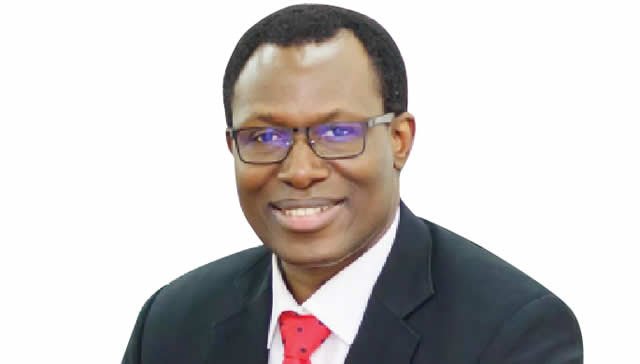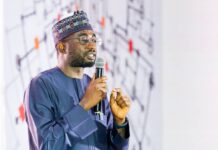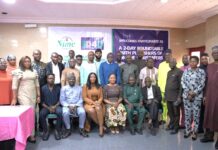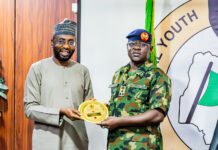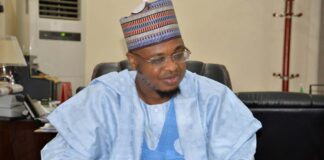Telecoms Has Become Nigerian’s Common Wealth – Adebayo
TECHDIGEST – Chairman, Association of Licensed Telecoms Operators of Nigeria (ALTON), Mr. Gbenga Adebayo, gives insight into GSM revolution in Nigeria; it’s transformational impact on the economy and how it has become the common wealth of all Nigerians. Emma Okonji presents the excerpts:
Nigeria is celebrating 20 years revolution of Global System for Mobile Communications (GSM) rollout. How will you describe its impact on economy and Nigerians?
In the last 20 years of GSM rollout, significant transformation has taken place in Nigeria, and I want to thank the media for the good narratives that have also helped in putting things in the right perspective.
In the last 20 years, Nigerians took joint ownership of mobile communication and today it has become our common wealth. I do not see how the world will develop without mobile services and I do not see how Nigeria will make significant progress without telecommunications.
In the last 20 years of GSM, Nigeria has done very well, the telecoms industry has done very well and all industry stakeholders have done very well.
I want to also thank the government for the political will to license GSM operators in 2000 and for providing the enabling environment for the GSM rollout in 2001.
Certainly, telecoms investments as at 2021, should be quadruple of the $70 billion that was recorded in 2015, the reason being that by 2015, the world was not fully digitalised, but today, the world, including Nigeria is fully digitalised. Telecommunications has impacted positively on commerce, banking, insurance, health, manufacturing and other sectors of the economy. The Nigerian Communications Commission (NCC) and the National Bureau of Statistics (NBS), are in a better position to give the accurate figure of investments in telecoms in Nigeria, but I know the investment is huge by now and has surpassed what it used to be in 2015, in terms of job creation, foreign direct investments and in terms of contribution to GDP, commerce and security, because of the many digital transformations going on in Nigeria. Telecoms have impacted positively on all sectors of the economy. So apart from the earnings from the telecoms sector, we can also look at the earnings of other sectors that are dependent on telecoms, to see how much telecom has impacted the Nigerian economy generally.
What are the key benefits of GSM to the Nigerian economy since 2001?
GSM transformation in 20 years is a function of rapid changes in technology. Before GSM technology, there was Code Division Multiple Access (CDMA) technology, but all these have transformed to total neutrality of technology, leading to availability of service, quality of service among others, and they have brought about significant improvement on mobile communications. We have transformed from 1G technology, which was the CDMA technology, to 2G, 2.5G, (voice only) 3G, 3.5G, 4G and 5G technology. At the last count, Nigeria has 40 per cent of 4G coverage across the country. These transformations are functions of technology, but the beauty of it is that Nigeria moved at the right speed of technology, and if the country had not moved in that speed by adopting emerging technologies, we would not have had that rapid growth.
Today there is no kind of service on the network of developed countries that is not on our networks in Nigeria and we give the credit to our operators. So part of the progress we have made as a country, is by accepting and adopting the rapid changes in technology. We adopted emerging technologies, developed the right human capital to support the technologies, such that we did not depend on foreigners for service management, even though we depended on them for technology and that in itself, helped us to develop and to grow rapidly. We are looking at a time when we will no longer depend on foreign players for technical support, when GSM equipment will be manufactured in Nigeria.
SIM card sales at the beginning of GSM was N20, 000, it later dropped to N17, 000 and today SIMcards are sold for N100 and some operators even offer it free of charge to customers. We started with the macro SIM card, and later moved to micro SIM card and nano SIM card. Today the world is talking about the embedded SIM card, which is eSIM. All these are technology transformation, which clearly shows that as we advance in technology, the devices were becoming smarter, more intelligent and smaller in size. We used to have larger phone batteries that last for few hours, but today phone batteries are smaller in size and last longer. Initially mobile phones come with external antennae but today antennae are embedded inside of the mobile phone, for easy use and carriage.
Early telcos were given five years exclusivity period, and taxes waved within that period. How did the exclusivity period help in shaping the telecoms industry?
The five years exclusivity period offered to early operators by the telecoms regulator must be commended because it was useful and it did three things for the operators. Firstly it led to rapid development of telecoms in Nigerian, because the regulator said it does not want briefcase operators, but operators who were willing to invest in Nigeria to grow the telecoms sector. It also helped the telecoms sector to have physical infrastructure and there were telecoms masts at different locations that were installed by telecoms operators. Part of the criteria for sustaining the exclusivity right was a proof of deployment of telecoms services. So the early operators were granted national licence that gave them access to national coverage. At that time, Nigerian Telecommunications Limited (NITEL), was a national carrier and was meant to provide national backbone, which automatically made NITEL to be relevant during the period of the emergence of GSM in Nigeria. But as the technology advances, regulatory barriers were removed and operators were able to carry national traffic by themselves.
Without the exclusivity that we had a time in the telecoms industry, the growth we had at that time, would not have been achieved, and we thank the regulator for that foresight. At a point, in order to overcome the challenge of congestion, national roaming licence was considered to enable operators roam to another network that has network capacity in areas where the roaming operator does not have network capacity.
All these helped the rapid development of telecoms in Nigeria in the last 20 years. Today subscriber number is over 200 million, up from less than 400,000 lines that we had prior to GSM rollout in 2001.
Collocation has been described as key factor in achieving so much success in 20 years. What is your view about collocation?
Within the first five years of exclusivity period, there was regulatory requirement to build physical infrastructure, but when transformation came and deployment was adequate, the regulator saw a need for co-location and co-sharing, and so the need for operators to build their own physical infrastructure was no longer there, since they can collocate on a single mast and share infrastructure, and that was when outsourcing of building base stations came in place. Private infrastructure companies were licensed to build telecoms masts, where operators could come together to mount their antennae on the same telecoms mast and collocate. This again enabled rapid development, occasioned by the right regulatory environment, right human capital and right sense of ownership.
No doubt, there were some challenges in the past 20 years. What were those challenges?
Despite the progress made in the last 20 years, we still had our challenges in the areas of poor electricity, willful destruction of telecoms infrastructure, multiple taxation, indiscriminate charges, denial to Right of Way (RoW), incessant disconnection of telecoms facilities, among others.
In the area of poor electricity, we are trying to overcome it with the use of alternate energy like solar energy, wind energy, to generate electricity that will power base stations.
We had other several challenges but we were able to weather the storm and came out strong in all of those battles. ALTON was formed as a result of the many challenges faced by telecoms operators.
Read Also:
First we had the battle of connectivity. NITIEL in its days, was all- in-all. NITEL was the regulator, operator and transmission company. So it became difficult for the early telecoms operators to connect with NITEL, when NITEL was the only access point connecting other operators, and the operators had to pay for the connecting links called the E1 links. It was so bad then that operators could not connect to themselves, without passing through NITEL. So operators may have enough capacity to interconnect with other operators, but because NITEL was the only national carrier at that time, all operators must have enough E1 links to pass through NITEL before interconnecting with other operators. In spite of government and budgetary support for NITEL as the only national carrier at that time, NITEL compelled the early telecoms operators to build a Private Telecoms Operators (PTOs) room at NITEL exchange for the purpose of interconnectivity. We paid for building the PTOs room, we bought the PTO equipment ourselves and we were equally paying to NITEL for access to that PTO exchange. When the International Telecommunications Union (ITU) introduced a new signaling point called SS7, NITEL at that time, had all its telecoms equipment on MFCR2.
So we needed to invest in a signal converter to convert signals from NITEL’s MFCR2 and convert to SS7, which was at that time, compatible to te equipment of telecoms operators. NITEL has to force telecoms operators to pay for the converters before we were able to connect to NITEL to access the SS7. So early operators paid for PTO room, paid for converters to connect to E1, and at the end of the month, NITEL sends a bill to telecoms operators for interconnectivity access to NITEL E1, and will they quickly disconnect any operator that delays to pay. NITEL will not allow the early operators connect with themselves, except they pass through NITEL. So when operator ‘A’ links NITEL in order to connect to operator ‘B’, the operator ‘A’ pays to NITEL for the link, but if NITEL routes traffic from NITEL network to the network of operator ‘A’, NITEL does not pay operator ‘A’ for routing traffic through the network of operator ‘A’. So we had to fight to battle of access to interconnectivity among telecoms operators. We approached the NITEL to remove the barriers of interconnectivity and a technical committee was then set up to discuss it, and I was the chairman of the technical committee, which recommended removal of the NITEL barrier to interconnectivity. We eventually won that battle and the barrier was eventually removed and a separate interconnect exchange was built to connect all the private telecoms operators together. That again led to the introduction of Interconnect Clearing House (ICH), to manage interconnection among telecoms operators and to also manage dispute resolution in interconnectivity among the operators.
By the time GSM was introduced, there became congestion using the single interconnect clearing house. So individual PTOs started connecting directly to GSM operators that have the capacity but do not have the licence of national carrier, and so depended on NITEl to carry traffic on the national route, and most cases, NITEL links are down, a situation, that compelled GSM operators to seek approval from the regulator to have a national carrier licence, which was granted to them.
In the issue of power, the regulator had promised telecoms operators of 24 hours steady power supply from the national grid within the first five years, and there is a document to that effect, but government failed in that agreement. In that same document, telecoms operators were mandated to rollout 10, 000 base stations in the country but that was achieved within the first one year of rollout. Energy challenges remain unsolved up till today and operators have to find ways to deal with the challenges.
Multiple taxes and denial of RoW have been a major hindrance to network expansion across networks. How were these challenges resolved?
At a time, government started seeing telecoms industry ad extractive industry, rather than contributive industry, and government started imposing all manners of taxes on telecoms operators and was denying operators of access to Right of Way (RoW). All the taxes and denial of RoW, slowed down telecoms growth at some point. So factors like power, multiple taxation, multiple regulation among others, slowed down network expansion, which invariable slowed down telecoms growth.
Security and vandalisation of telecoms facilities also affected telecoms growth.
Cost of RoW became as high as 70 per cent of the project cost, and it became unattractive to telecoms operators, leading to huge broadband capacity in the shores of the country because operators were unable to transmit that capacity though fibre optic cable laying to hinterlands. We took the challenge to the federal government and the National Economy Council decided to fix a flat rate of N145 per linear metre charge for RoW, which only few states have adopted. Our current Minister, Dr. Ibrahim Pantami, has further taken the issue to the Governors Forum, where most state governors have agreed to adopt the flat rate of N145 per linear metre, as against the earlier indiscriminate changes that range between N500 to N6,000 per linear metre across states. Some states are not even charging for RoW because they now realize that the social-economic benefits of telecoms services, far outweigh the Internally Generated Revenue (IGR) of the states. If they open their states to Information and Communications Technology (ICT) development, it means their stares will be open to massive development.
The Unstructured Supplementary Service Data (USSD) code, which telecoms operators provided to support banking transactions, became an issue between the banks and telecoms operators. How was it addressed?
Yes, there was an issue of unpaid accumulated money that was due to be paid to the telecoms operators by the banks who use the service, but as we speak, there is light at the end of the tunnel for USSD imbroglio, based on the intervention of the Minister of Communications and Digital Economy, Dr. Isa Ibrahim Pantami and the Governor of Central Bank of Nigeria (CBN), Mr. Godwin Emefiele. At some points of our argument with the banks, the banks claimed they do not charge their customers for USSD services but that is not true because we are aware that they charge for the USSD services. The debt grew over time to N50 billion but ministerial intervention did not allow us to make do our threat of withdrawing the code, but in all, an agreement has been reached based on the interventions. We are optimistic that the intervention will facilitate payment of the debt and we think that the Memorandum of Understanding (MoU) that would be signed between the banks and the telcos, would address all lingering issues. So it is not as bleak as it was in the past, and we can see light at the end of the tunnel now and we need to thank the CBN Governor and the minister for their interventions, as well as the telecoms regulator, the Nigerian Communications Commission (NCC).
For 20 years of GSM rollout, subscribers’ complain about poor service quality is still on the rise. Why is it so?
Subscribers complaints about poor service quality will continue to be on the rise, so long as we do not have a fully built public infrastructure. If the public utilities are not fully built, there will be poor service quality and subscribers will continue to complain. As long as road construction continues across the country, the tendency to damage underground telecoms infrastructure will be there, and this will lead to outage of telecoms services. So long as government refused to declare telecoms infrastructure as critical national infrastructure, we will continue to experience willful destruction of telecoms facilities across the country, which will disrupt quality of telecoms services. So long as we continue to have national security issues, where operators can not send field workers to manage telecoms cell sites in most parts of the country, we will continue to experience poor service quality. So until our public utilities are fully built, we cannot guarantee uninterrupted service and high quality of service across network, even though it can be mitigated.
The NCC is of the view that access to Universal Service Provision Fund (USPF) will drive rural telephony. To what extent have telecoms operators leveraged the opportunities around USPF to further drive rural telephony?
Quite a number of our members are able to access the Universal Service Provision Funds (USPF) to drive rural telephony, and the impact is great.
The reason why most operators are reluctant to operate in rural areas, is because of the security issues in those remote areas. So government needs to address the environmental challenges in rural areas in order to create more telecoms impact on rural communities.
How will you describe broadband availability and cost of broadband services across the country?
There are many variables for pricing and it is not possible to solve pricing challenges by regulatory interventions. It has to be driven by market forces. For there to be deregulation of pricing, infrastructure has to be available, and for infrastructure to be available, government has to do a lot more by giving operators access to build infrastructure and support operators in re-building infrastructure, when damages occur. So for us to have ubiquitous and cheap broadband access, we need more infrastructure. So we have enough broadbased capacities on the shores of the country but we do not have the infrastructure like national backbone infrastructure to transmit those broadband capacities to hinterlands, hence the high cost of broadband services in the country.
What is the level of spectrum availability for telecoms service rollout?
For spectrum availability, the frequency management commission has to do a lot more of audit to know the available spectrum that has been licensed and not in use by the operators. For example we have the Tv white channel that has lots of resources that can be used for broadband deployment.
Source: Vanguard News


